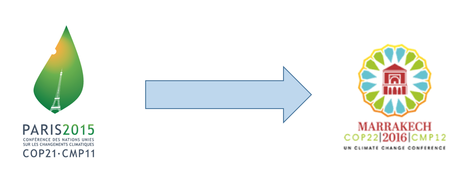|
The conference began rather quickly, in the sense that many of the presenters were ready to move past COP 21, fleetingly mentioning the standards set, and were setting new objectives and stating new problems moving forward. This aggressiveness was appreciated because what I expected coming into this conference was cloudy bureaucracy I started the conference with my first side-event: Vietnam’s implementations of the Paris Agreement (just a couple days back, they were able to get the agreement ratified through their National Assembly). This is really where the challenges of implementation of the Paris Agreement became apparent and more importantly the value of COP 22 in Marrakesh. Vietnam pointed out they had to handle 5 main issues while constructing a climate policy proposal: (1) high startup costs associated with policy implementation and green technology, (2) low financing success (high transaction costs and difficulty in obtaining international climate finance), (3) interconnectedness (most actors need to work with more stakeholders instead of working with just their preferred partners), (4) patents (how does Vietnam transfer technology from one country to another), (5) Pathways to NDC - Nationally Determined Contributions (Bankers are not experts in climate financing and determining whether if an investment is feasible).
Another interesting event regarding climate change implementation was presented by the United States Pavilion. The US introduced the recently developed Climate Resilience Toolkit, https://toolkit.climate.gov, which offered a framework for local communities in the United States to tackle local environmental issues which were specific to their county. The usability of the toolkit is really where the site shines; the site offers three main features: (1) guidelines to developing climate resilience policy, (2) graphs on climate change, and (3) climate data relevant to your location. I personally feel that this is the future for local development of climate policy. Nevertheless, all-in-all the Paris Agreement was very successful in setting the minimum bar for nations (regardless if it was above or below what they could contribute), and Marrakesh is where the action and implementation begins, as can be seen by the initiative taken by the US and Vietnam.
5 Comments
Kyle B
16/11/2016 09:55:53 pm
I appreciate the aggressiveness too, Narayan, because there needs to be a constant push with new objectives set, but we can't continue to move forward without establishing a firm, clear groundwork that minimizes problems. It's great to see that countries are already taking action. However, it's clear to see many things are preventing implementation in places like Vietnam. I'm curious as to what measures can be taken to help them handle the five issues with constructing climate change policy. Perhaps some assistance from other countries like the US that have more well established policies already in place could help Vietnam develop theirs.
Reply
Hannah Kruelle
17/11/2016 12:32:32 pm
Its good to hear that progress is being made and that the Paris agreement is starting to take action. The forward pace on theses issues leaves a lot of hope for the future.
Reply
Emily Miller
20/11/2016 03:57:53 pm
I'm glad to hear the Paris Agreement is moving forward and refining some things. I fear the high start up will turn some countries away from agreeing to this. The COP21 worried about big countries not agreeing and causing the agreement not to be passed, and the US election may have made that a little more difficult. However on the bright side, the US was one of the first countries to try to handle their local environmental issues.
Reply
Sarah Estes
21/11/2016 09:17:44 am
I feel like Vietnam not sugar coating the hurdles they foresee will truly help other nations move forward from the Paris agreement into meaningful action. Yes, there will be upfront costs and red tape from having to work across multiple platforms to accomplish the final goals, but it will become economically viable as the world transitions.
Reply
Sarah Estes
21/11/2016 09:18:13 am
I feel like Vietnam not sugar coating the hurdles they foresee will truly help other nations move forward from the Paris agreement into meaningful action. Yes, there will be upfront costs and red tape from having to work across multiple platforms to accomplish the final goals, but it will become economically viable as the world transitions.
Reply
Leave a Reply. |
Categories
All
Archives
March 2024
|

 RSS Feed
RSS Feed
